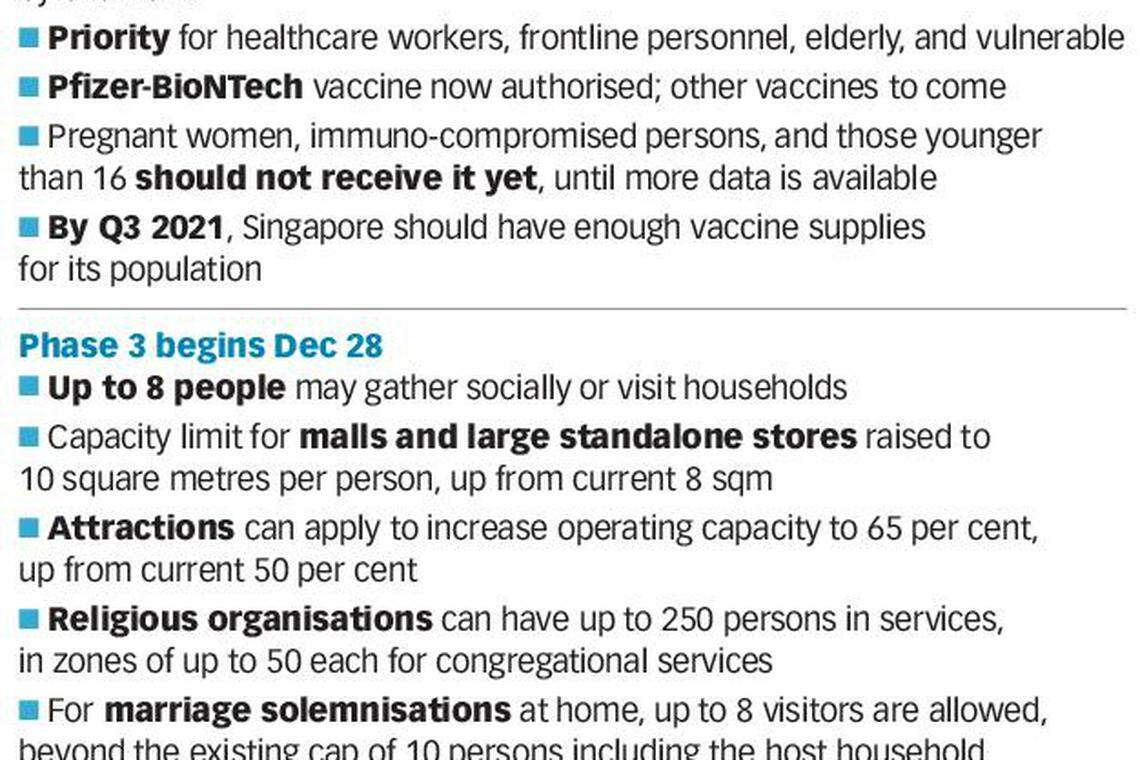Vaccination plan a boost for growth in 2021, but border reopening remains key
As more people here and abroad get vaccinated, badly-hit sectors of aviation, travel and tourism can begin to see recovery: economists


Singapore
WITH Covid-19 vaccination set to be available to all long-term residents by end-2021, Singapore's growth may gain a boost late in the year, said economists - though much hinges on the extent of border reopening.
The start of Phase 3 this Dec 28, meanwhile, is likely to bring only a modest uplift, they said in response to Monday's update on the pandemic.
Singapore has set aside more than S$1 billion for vaccines, and if all goes to plan, it will have enough vaccines for its population by the third quarter of 2021, said Prime Minister Lee Hsien Loong in a national broadcast.
Vaccination will be free for long-term residents, including long-term work pass holders. Healthcare workers, frontline personnel, and the elderly and vulnerable will get priority.
The aim is then to progressively vaccinate the rest of the population, with everyone who wants the vaccine being able to get it by the end of 2021.
A NEWSLETTER FOR YOU

SGSME
Get updates on Singapore's SME community, along with profiles, news and tips.
Barclays economist Brian Tan said a faster-than-expected distribution of vaccines implies upside risks to their 2021 gross domestic product growth forecast of 4 per cent.
"Exports and manufacturing have proven to be relatively resilient this year and will likely continue to lead the recovery, especially if a Covid-19 vaccine is also distributed in developed markets in the near term, lifting external demand," said Mr Tan.

In his speech, Mr Lee said: "Vaccines will support our recovery in more ways than one." As an aviation hub, Singapore will play a crucial role in transporting vaccines around the world, and is gearing up to handle large volumes of these shipments.
He had earlier highlighted the need to preserve Singapore's status as an air hub, saying: "The longer our own borders stay closed to travellers, the greater the risk of us permanently losing out as an international hub, and consequently hurting our livelihoods." The "only option" is to reopen the borders in a controlled and safe manner, he added.
But much depends on other countries, said Maybank Kim Eng analyst Chua Hak Bin. "Vaccines will likely help the domestic sector a lot more than the travel-related sectors."
"Significant easing of border controls will depend on other major markets, especially our neighbours, achieving high vaccination rates and herd immunity as well," he added.
This means that Singapore's economic growth could be moderated in some way by countries that lag in the vaccination process, said DBS senior economist Irvin Seah. This is especially for countries with large populations, such as Indonesia and India.
"Those countries may still find it difficult to vaccinate the country not because there's a lack of vaccines in terms of quantity but it's just because of the logistical challenges," he said.
On the bright side, Singapore's economic activities with countries that are "on the same page of vaccination" - such as Japan, South Korea or China - could improve much faster, he said.
While vaccines from US drugmakers have generated much buzz, UOB senior economist Alvin Liew believes options offered by Russia and China could come at a lower price point, making them more viable for the emerging market. This could lead to a faster-than-expected vaccination rollout in the region, creating an "upside surprise" that would boost Singapore's growth in Q2, he said.
"There might be a significant take- up of some of the other vaccines that are available from China ... and that would provide some earlier turnaround, especially for the services-related sectors," Mr Liew said.
Singapore's vaccination plans should boost confidence, attracting travellers and investments, said Singapore Business Federation chief executive officer Ho Meng Kit.
But he warned against excessive optimism: "We should not expect a rapid uplift of the economy in 2021 as there remain huge uncertainties for the global economy... Whilst business sentiment will certainly improve next year, it is important not to get ahead of ourselves and act as if the pandemic is behind us."
Roland Ng, president of the Singapore Chinese Chamber of Commerce and Industry, said companies should continue to adapt to the changing environment in order to seize business opportunities in the future.
This includes enhancing enterprise capability, strengthening collaboration in overseas markets and leveraging on new opportunities of Singapore-China cooperation, Mr Ng said.
In his speech, Mr Lee also announced the third and final phase of reopening, from Dec 28.
Capacity limits will be raised for malls and large standalone stores, at attractions, in places of worship, and for live performances. Gatherings or visits of up to eight people will be allowed, an increase from the current limit of five.
This "will make it easier to hold family get-togethers during the festive period", said Mr Lee. But he urged continued caution and vigilance, as Covid-19 is most likely still circulating silently in the community.
The economic impact of Phase 3 will be muted compared to earlier changes of phase, said economists.
"Most economic activities had already resumed or were already set to reopen under the first two phases, albeit with notable constraints on capacity," said Barclays economist Brian Tan. Phase 3's rise in capacity may give greater headroom for growth in 2021, but "does not significantly alter the economic landscape", he added.
Dr Chua also sees Phase 3 as leading "to only a small incremental uplift compared to the move to Phase 2", with its impact to be seen in early Q1.
"The bigger uplift will materialise when border controls can be significantly relaxed, which is only more likely in the fourth quarter of next year when more countries achieve herd immunity," he added.
Even so, the combination of vaccines and the move into Phase 3 should boost business and consumer confidence in Q1, especially in the run up to Chinese New Year, said Selena Ling, OCBC chief economist.
"Domestic economic activities will definitely improve, especially for the food and beverage, retail and other recreation and entertainment industries," she said.
* More reports on Virus outbreak: Phase 3 and beyond:
KEYWORDS IN THIS ARTICLE
BT is now on Telegram!
For daily updates on weekdays and specially selected content for the weekend. Subscribe to t.me/BizTimes
Economy & Policy
PM Lee to stay on as senior minister; Cabinet reshuffle due ‘a few days’ before May 15: Lawrence Wong
New pathway lets Singapore accounting undergrads get chartered accountant qualification faster and at no cost
CAAS to set up new air traffic control centre housing data scientists, weather experts
PAP ministers, MPs pay tribute to PM Lee’s decades-long leadership
Employers must process all flexi-work requests from Dec 1
From guitar covers to TikTok, Lawrence Wong has found his own tune
